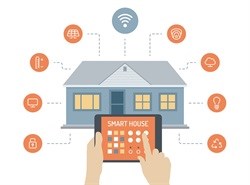In this day and age, the rate of technological advancement is travelling at record speed, with modern-day consumers capable of accessing masses of information instantaneously at the click of a button.
Technology has become a vital part of our everyday lives, allowing us to communicate with people from across the globe without having to leave the comfort of our homes. It has changed the way people interact with one another and continues to change the way we live.
Talk of a fully automated home
According to Adrian Goslett, CEO of RE/MAX Southern Africa, devices such as smartphones and tablets have become essential tools in today's fast-paced, competitive business environment. The business world is not the only place that has seen the benefits of the massive computing power available in this modern age. Technological advancement is providing homeowners with more efficient means of taking care of their home and freeing them up for other things such as education, career advancement or hobbies.
He notes that the concept of a fully automated home has been around for some time. However, it is only in the last five years that there has been a more rapid growth in this kind of technology, largely due to the development of faster wireless networking. Goslett says that another factor that has pushed this technology forward is that more and more homeowners are looking for ways to decrease the cost of their utility and home energy bills, so are looking for devices that are automated or can be controlled via a wireless connection.
"Currently many international companies have poured masses of resources into developing internet-connected devices and are launching them within the public domain. These include items from a digital toothbrush that is able to connect to the home's wireless network and analyses the user's brushing habits, to a door that sends the homeowner a text message to alert them if the door has been unlocked," says Goslett. "There is currently a wide variety of items that are available to consumers that can be controlled and can communicate to the user through the internet. These devices are known within the technology world as the internet of things."
Future prospects
It is predicted that by the year 2020, more than 50 billion objects and devices will be connected to the internet globally. The growing trend for home automation and the use of technology to control home appliances and features has become of utmost importance to many large corporations. "Google has recently acquired Nest, a home automation company that designs and manufactures programmable thermostats and smoke detectors. Both of these products can be controlled remotely via the internet. The idea is to try and develop the building blocks that will turn the concept of a fully automated home into a reality. The race is on for companies to provide the required products and take technology to the next level of integration," says Goslett.
He notes that while home automation technology is currently expensive, this is likely to change in the near future. As developments in the technology arena continue, it will become cheaper and more accessible. We may even see future housing built with the technological gadgets already installed as a feature. In fact, the cost of many electronic devices have already dramatically dropped in price and are more easily available. Advancement in devices that use Wi-Fi and other wireless data connections have also made it easier for users to integrate their homes' electronic systems with items that they currently own, such as a smartphone.
"The more automated products that become available to homeowners at affordable prices, the sooner the idea of a fully automated and connected home becomes a reality for more homeowners. Although there will be certain limitations with the current available technology, with the rapid rate at which technology changes, the possibilities for a smart home will be endless," he concludes.


























